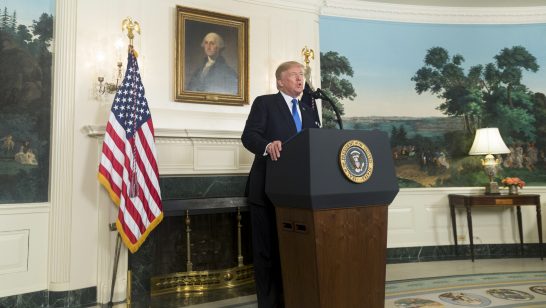
In a memorable scene from Stanley Kubrick’s Dr. Strangelove, the protagonist, General Jack D. Ripper, twists a quote by George Clemenceau and argues that war has become ‘too important to be left to politicians.’ An appropriate adaptation of the quote for our time is that the risks associated with nuclear war have become too important to be left to the nuclear-armed states. In the field of nuclear arms control, the non-nuclear-weapon states have for decades served the role of moralizing spectators with little real influence. Judging by recent developments, however, the non-nuclear-weapons states are slowly realizing that a world without nuclear weapons will not come about unless they do something about it themselves.
A Humanitarian Liability
In March this year, nearly 130 States attended the first-ever international Conference on the Humanitarian Impact of Nuclear Weapons in Oslo, Norway. In his summary of the discussions, the Norwegian Minister of Foreign Affairs, Espen Barth Eide, emphasised three main points. First, that the use and testing of nuclear weapons in the past had “demonstrated their devastating immediate and long-term effects.” Second, that “it is unlikely that any state or international body could address the immediate humanitarian emergency caused by a nuclear weapon detonation in an adequate manner and provide sufficient assistance to those affected.” Third, that the effects of a nuclear weapon detonation “would not be constrained by national borders, and would affect states and people in significant ways, regionally as well as globally.”
These observations may seem obvious, yet exploring the exact nature of these consequences is nevertheless important. For one, it enables a proper assessment of the risks we are facing. The debate about the future of these weapons should not be based solely on abstract theories about national interest and balance of power. It should be informed by a thorough understanding of what the use of these weapons entails, including their actual effects on people and livelihoods. And the truth is that the effects of nuclear weapons cannot be contained in either space or time. Even states and regions that have declared themselves free from nuclear weapons will not be able to protect themselves from their humanitarian impact.
An Empowering Discourse
Having left the issue of nuclear disarmament to the good faith of the nuclear-armed states for decades, the vast majority of the United Nations Member States has remained largely disenfranchised. With the ‘humanitarian discourse’ on nuclear weapons, however, the non-nuclear weapons states seem to be laying the groundwork for re-entering these discussions. It provides the non-nuclear-weapon states with a platform for demanding that their concerns are placed on equal footing with the security considerations of the nuclear-armed states. The humanitarian discourse offers, in other words, an opportunity for the non-nuclear weapons states to re-assert themselves and, in effect, level the diplomatic playing field.
For the five recognized nuclear-weapon-states, however, a levelled playing field is probably not an appealing prospect, and they presumably realize that within the humanitarian discourse on nuclear weapons lie troubling questions about their intention to implement their part of the 1968 NPT-bargain, namely to completely eliminate their own nuclear arsenals.
For many of the non-nuclear-weapon states, these questions have not only been asked, but also translated into clear demands for action. And the one demand around which an ever growing number of both governments and NGOs are converging, is the demand for a general prohibition on nuclear weapons along the same lines as the prohibitions on chemical and biological weapons. While the idea of such a prohibition stretches decades back, the empowering component of the current thinking is that such a prohibition could be negotiated and ratified even without the nuclear-weapon states on board — because a ban on nuclear weapons, it is argued, is not about the nuclear-weapon states. It is about the weapons themselves and their unacceptable humanitarian consequences.
A Counterproductive absence
With this in mind, it was perhaps no big surprise the five NPT nuclear-weapon states decided not to attend the conference in Oslo in March. The problem with not showing up to a meeting like the one in Oslo is that if a sufficient number of states do participate, such absence risks defeating the intended purpose. The effect of the non-participation by the five nuclear-weapon-states at the Oslo meeting was by and large that these states appeared slightly arrogant and irresponsible, and instead of weakening the humanitarian discourse, their absence seemed to have strengthened it. A follow-up conference is already slated for Mexico in February 2014 and the discourse is gradually spreading into other multilateral forums as well.
Humanitarian Disarmament
As was demonstrated by the 1997 Anti-Personnel Mine Ban Convention and the 2008 Convention on Cluster Munitions, there are ample opportunities for those ready to exert normative leadership, even in the face of powerful resistance. The experience from those conventions shows that careful documentation of the humanitarian consequences of the weapon in question can be a potent catalyst for change. In addition to building a strong set of arguments in favour of the Conventions, a process of re-framing these weapons from a humanitarian perspective also served to mobilise new actors, including the ICRC and various parts of the UN system. The same is now happening with regards to nuclear weapons.
Another important lesson from these previous processes is that there are no compelling reasons why disarmament needs to precede prohibition. On the contrary, both conventions have been remarkably successful in achieving disarmament after their adoption, as well as in preventing proliferation and further use.
A Window of Opportunity
By elaborating a humanitarian discourse on nuclear weapons the non-nuclear-weapons states, and other actors, have created a window of opportunity. At the end of the day, however, a humanitarian discourse is nothing more than a way of thinking. If the initiative is to generate meaningful results, States and other actors will have to make use of the possibilities it affords them. Put frankly, what use is there in striving to level the playing field if the non-nuclear weapons states lack a vision for what might follow? What is needed in order to translate the humanitarian window of opportunity into tangible progress on nuclear disarmament is resolute normative leadership on the part of the non-nuclear-weapon states. There will be no fire without a spark, and without the spark of leadership, the momentum generated by the humanitarian initiative will likely go nowhere.
The opinions articulated above represent the views of the author(s), and do not necessarily reflect the position of the European Leadership Network or any of its members. The ELN’s aim is to encourage debates that will help develop Europe’s capacity to address the pressing foreign, defence, and security challenges of our time.




